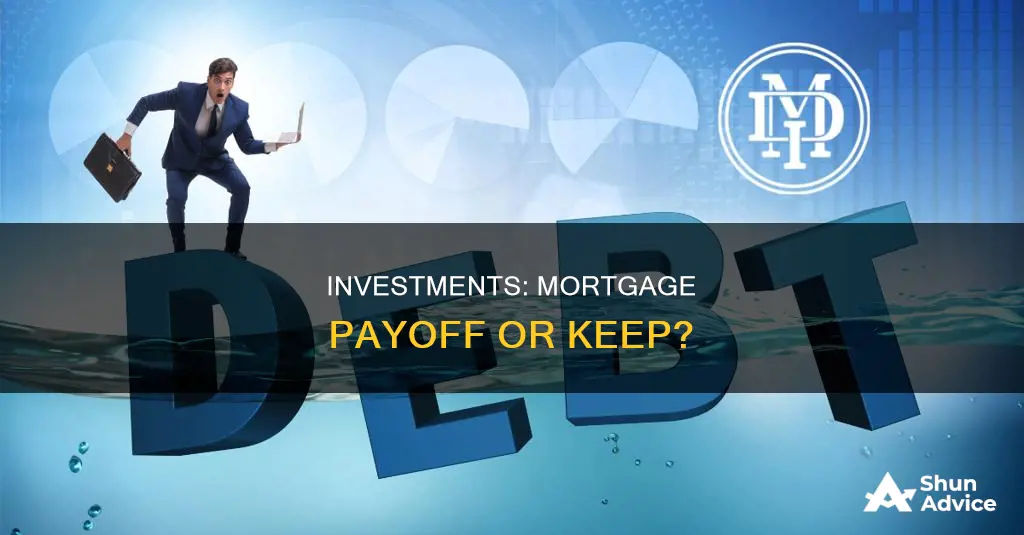
Deciding whether to use your investments to pay off your mortgage early is a complex decision that depends on your financial situation, risk tolerance, and life goals. Here are some key factors to consider:
- Financial Circumstances: Paying off your mortgage early can save you thousands of dollars in interest over the life of the loan, but it may also deplete your savings and limit your investment opportunities for retirement or other financial goals.
- Interest Rates and Market Conditions: Compare your mortgage interest rate with expected investment returns. If the returns on new investments are expected to exceed the interest savings from paying off your mortgage early, investing may be a better option.
- Risk Tolerance: Paying off your mortgage early provides a guaranteed return on investment and reduces risk. Investing in the stock market or other vehicles can offer higher returns but carries the risk of losses. Your tolerance for risk will influence your decision.
- Retirement Planning: The earlier you start saving for retirement, the more you can benefit from compound interest. Consider if paying off your mortgage early will impact your ability to save for retirement.
- Tax Considerations: Paying off your mortgage early may result in losing tax deductions on mortgage interest payments and could impact your tax strategy.
- Peace of Mind: Being debt-free and owning your home outright can provide a sense of security and peace of mind. Weigh this against the potential financial benefits of investing.
- Liquidity: Investments like stocks, bonds, and mutual funds are highly liquid, meaning you can easily access your money by selling them. In contrast, property is an illiquid asset, and accessing your home equity may require taking out a loan or selling your home.
| Characteristics | Values |
|---|---|
| Financial situation | The decision depends on the borrower's financial circumstances, including their savings, investments, and other debts. |
| Interest rates | The interest saved by paying off a mortgage early should be weighed against potential investment returns. |
| Retirement | Paying off a mortgage may be more beneficial for retirees who no longer have employment income. |
| Risk tolerance | Paying off a mortgage is generally considered lower risk, while investing in the stock market carries higher risk but potential for higher returns. |
| Tax deductions | Mortgage interest payments may be tax-deductible, which can reduce taxable income. |
| Investment opportunities | Investing extra cash may provide opportunities for higher returns, such as through stocks, bonds, or retirement accounts. |
| Peace of mind | Paying off a mortgage early can provide peace of mind and reduce financial burden, especially in the case of an emergency. |
| Credit score | Paying off a mortgage can potentially improve an individual's credit score. |
What You'll Learn
- Paying off your mortgage early can save you thousands in interest
- Investing your money instead may generate higher returns
- Paying off your mortgage can give you peace of mind
- Investing in the stock market is riskier but can offer a higher rate of return
- Consult a financial advisor to help you analyse your personal situation and goals

Paying off your mortgage early can save you thousands in interest
Paying off your mortgage early can save you thousands of dollars in interest payments. The sooner you pay off your mortgage, the less interest you will pay overall. This is because, in the early years of a mortgage, most of your money goes towards interest and does little to reduce the loan's principal.
Let's look at an example. Say you have a 30-year mortgage of $200,000 with a fixed interest rate of 4.5%. Your monthly payments would be $1,013 (not including taxes and insurance), and you would spend a total of $164,813 in interest over the life of the loan. Now, let's say that you're able to come up with an extra $300 per month to put toward your mortgage. You would save $67,816 in interest.
However, it's important to note that there are also some disadvantages to paying off your mortgage early. One is the potential loss of tax deductions. Mortgage interest payments are tax-deductible if you itemize deductions on your tax return. Additionally, paying off your mortgage early can result in a depletion of your savings, as you are putting a large amount of money into an investment that is not easily accessible. Another thing to consider is that housing appreciates at a lower rate overall than the stock market over time.
Ultimately, the decision to pay off your mortgage early depends on your individual financial situation and risk tolerance. If you are unsure, it may be helpful to consult a financial advisor to determine the best course of action for you.
UK Cash Investment: Strategies for Success
You may want to see also

Investing your money instead may generate higher returns
Investing your money instead of paying off your mortgage may generate higher returns. Here are some reasons why:
Higher Returns
The stock market has historically returned an average of about 10%. While performance is not guaranteed, if your mortgage rate is less than 10%, you could gain more by investing. For example, if you have a 30-year mortgage with a fixed rate of 4.5%, investing your money instead could yield higher returns over time.
Liquidity
Stocks, bonds, mutual funds, and ETFs are highly liquid, meaning you can sell them quickly and access your money for other purposes. In contrast, property is an illiquid asset, and converting it into cash can be challenging and time-consuming.
Employer Match
If you invest in a retirement account, you may be able to take advantage of employer-matching contributions, which can boost your savings even further.
Building Wealth for Retirement
The earlier you start saving for retirement, the more you can benefit from compound interest. Investing in your future, whether through stocks, bonds, or a small business, can increase your future wealth and set you up for a more comfortable retirement.
Tax Benefits
Investing in a retirement account can provide tax advantages, such as tax breaks and the ability to invest pre-tax dollars, potentially increasing your contributions.
Risk Tolerance
If you have a high tolerance for risk and are comfortable with market volatility, investing may be a better option than paying off your mortgage early.
However, it's important to carefully consider your financial situation, risk tolerance, and retirement goals before making a decision. Paying off your mortgage early can provide peace of mind, reduce your overall interest payments, and improve your credit score. Additionally, it's essential to ensure you have sufficient emergency savings and are on track with your retirement planning before allocating a significant portion of your funds towards investments.
Smart Ways to Invest Half a Million Dollars
You may want to see also

Paying off your mortgage can give you peace of mind
Firstly, it eliminates a large monthly expense, which can be liberating. Depending on the size of your monthly payments, the money you save in payments could translate to thousands of dollars. This extra money can be used for other causes, such as personal hobbies or investing in your future.
Secondly, paying off your mortgage ahead of schedule means you will pay less interest overall. You could save thousands or tens of thousands of dollars in interest payments. When you pay your mortgage early, those interest savings are a guaranteed return on your investment.
Thirdly, paying down your mortgage faster means building equity in your home more quickly. This can help you qualify for refinancing, which can save you even more money in the long run. You may also be able to leverage your equity in the form of a home equity loan or home equity line of credit (HELOC), which you can use to make improvements that increase your home's value or pay off other higher-interest debt.
Lastly, if you experience a financial emergency, having a home that's already paid off means you don't have to worry about missing mortgage payments and potentially losing your home to foreclosure. You will still be responsible for property taxes as long as you own the home, but that's a much smaller financial responsibility.
Warren Buffet's Strategy for Investing Berkshire's Cash Reserves
You may want to see also

Investing in the stock market is riskier but can offer a higher rate of return
The stock market has historically returned an average of about 10% annually. While performance is not guaranteed, if your mortgage rate is less than 10%, you could gain more by investing.
The benefit of investing in the stock market is the potential for a higher rate of return. The average annual rate of return for stocks is 8%, but markets do fluctuate. There is a chance that your investments will earn higher returns than the interest you are paying on your mortgage.
However, investing in the stock market is riskier than paying off your mortgage. Stocks are volatile, and there are no guarantees. A bad year or two could put a big dent in your portfolio.
Additionally, investing in the stock market may provide less liquidity than paying off your mortgage. If you pay off your mortgage, you will own your home outright, and you will no longer have to make monthly mortgage payments. This can provide peace of mind and improve your cash flow.
On the other hand, if you invest in the stock market, you may not be able to access your money as easily. Selling stocks or other investments and making use of the cash can take time and may be subject to market conditions.
Therefore, when deciding whether to invest in the stock market or pay off your mortgage, it is essential to consider your financial situation, risk tolerance, and investment goals.
Easy Ways to Earn Paytm Cash Without Investment
You may want to see also

Consult a financial advisor to help you analyse your personal situation and goals
Consulting a financial advisor can be extremely beneficial when deciding whether to use your investments to pay off your mortgage. They can help you analyse your personal situation and goals, and provide expert guidance based on your unique circumstances. Here are some key factors that a financial advisor will consider:
- Risk tolerance: Different individuals have different levels of risk tolerance, which refers to your ability to handle market fluctuations and potential losses. A financial advisor will assess your risk tolerance and provide recommendations accordingly.
- Financial goals and priorities: Understanding your short-term and long-term financial goals is crucial. A financial advisor will help you prioritise these goals and determine how your investments and mortgage fit into the bigger picture.
- Interest rates and market conditions: The interest rate on your mortgage and the expected returns on potential investments are important factors in your decision. A financial advisor can help you evaluate these rates and make an informed choice.
- Retirement planning: Paying off your mortgage early may impact your retirement savings. A financial advisor can guide you on balancing your mortgage payments and retirement investments to ensure you're on track for a comfortable retirement.
- Tax implications: There are tax considerations associated with both mortgage interest deductions and investment returns. A financial advisor can help you navigate these complexities and optimise your tax strategy.
- Emergency funds and other debts: It's important to ensure you have sufficient emergency savings and that your other debts are under control. A financial advisor will help you assess your overall financial picture and determine the best course of action.
- Investment opportunities: A financial advisor can provide insights into various investment opportunities, such as stocks, bonds, mutual funds, or retirement accounts, and help you weigh the risks and potential returns of each option.
- Refinancing options: If you're considering refinancing your mortgage to obtain a lower interest rate or shorter term, a financial advisor can guide you through the process and evaluate the potential benefits.
Remember, there is no one-size-fits-all answer to the question of whether you should use your investments to pay off your mortgage. By consulting a financial advisor and carefully considering your personal situation and goals, you can make a well-informed decision that aligns with your financial objectives and risk tolerance.
Drip Investing: Smart, Safe, and Stress-Free Way to Invest
You may want to see also







